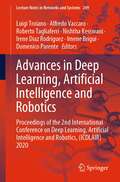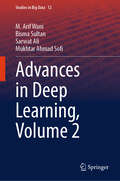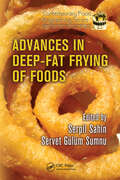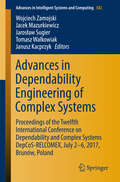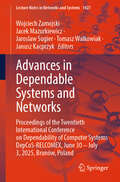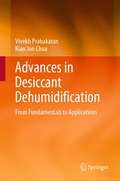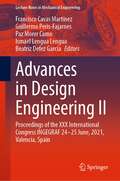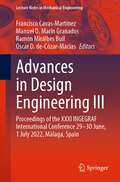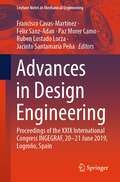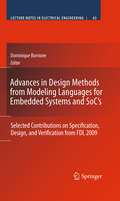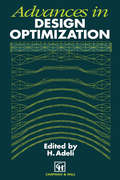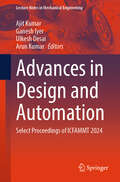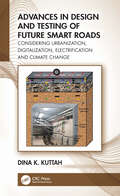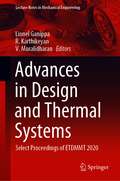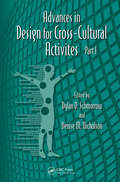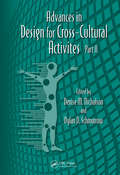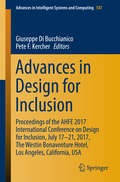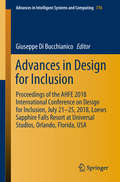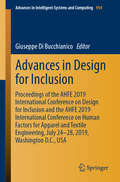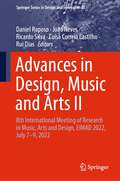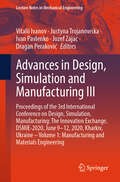- Table View
- List View
Advances in Deep Learning, Artificial Intelligence and Robotics: Proceedings of the 2nd International Conference on Deep Learning, Artificial Intelligence and Robotics, (ICDLAIR) 2020 (Lecture Notes in Networks and Systems #249)
by Alfredo Vaccaro Roberto Tagliaferri Luigi Troiano Nishtha Kesswani Irene Díaz Rodriguez Imene Brigui Domenico ParenteThis book of Advances in Deep Learning, Artificial Intelligence and Robotics (proceedings of ICDLAIR 2020) is intended to be used as a reference by students and researchers who collect scientific and technical contributions with respect to models, tools, technologies and applications in the field of modern artificial intelligence and robotics. Deep Learning, AI and robotics represent key ingredients for the 4th Industrial Revolution. Their extensive application is dramatically changing products and services, with a large impact on labour, economy and society at all. The research and reports of new technologies and applications in DL, AI and robotics like biometric recognition systems, medical diagnosis, industries, telecommunications, AI petri nets model-based diagnosis, gaming, stock trading, intelligent aerospace systems, robot control and web intelligence aim to bridge the gap between these non-coherent disciplines of knowledge and fosters unified development in next-generation computational models for machine intelligence.
Advances in Deep Learning, Volume 2 (Studies in Big Data #12)
by M. Arif Wani Bisma Sultan Sarwat Ali Mukhtar Ahmad SofiThis book describes novel ways of using deep learning to solve real-world problems. It covers advanced deep learning topics like neural architecture search, ensemble deep learning, transfer learning techniques, lightweight architectures, hybrid deep learning approaches, and generative adversarial networks. The book discusses the use of these advanced topics in selected applications like image classification, object detection, image steganography, protein secondary structure prediction, and gene expression data classification. Various challenges and future research directions falling under the scope of these topics are discussed.
Advances in Deep-Fat Frying of Foods (Contemporary Food Engineering)
by Serpil Sahin Servet Gülüm SumnuBattered fried foods consistently remain in high demand despite concerns about their health aspects, prompting food processors to develop new methods and alternative oils and batters in the name of healthy, tasty fried foods and high-performance, cost-effective frying oil. With contributions from an international panel of food technology authoritie
Advances in Dental Implantology using Nanomaterials and Allied Technology Applications
by Ramesh S. Chaughule Rajesh DashaputraAs the name suggests this book discusses how nanotechnology has influenced the provision of implant treatment from surgery to prosthetic reconstruction and post treatment biological complications. This book is a sequel to the earlier book “Dental Applications of Nanotechnology” published by Springer. It aims to present both the nanotechnology and allied research along with the clinical concepts of almost every different aspect of implantology in one volume. These two fraternities promote the translation of the research ideas and product development into fruitful practicalities. The first section covers nanobiomaterials in implant applications, in bone regeneration, prosthetic rehabilitation, to control biofilm and peri-implantitis, bone grafting and tissue engineering. The second section explores applications of such new technologies in the field of implantology that gives this book a unique feature by bringing science and technology into clinical application. It covers implant stability, peri-implantitis, lasers, CAD/CAM technology, impressions, 3D printing, reconstruction with bone grafts and zygomatic implants. Comprehensive coverage includes both simple and complicated clinical cases, with practical guidance on how to apply the latest research, diagnostic tools, treatment planning, implant designs, materials, and techniques to provide superior patient outcomes. The book is well written and structured making it easy for experienced clinicians and those new to dental implantology as well as students, researchers, scientists and faculties of dental universities
Advances in Dependability Engineering of Complex Systems: Proceedings of the Twelfth International Conference on Dependability and Complex Systems DepCoS-RELCOMEX, July 2 - 6, 2017, Brunów, Poland (Advances in Intelligent Systems and Computing #582)
by Janusz Kacprzyk Wojciech Zamojski Jacek Mazurkiewicz Jarosław Sugier Tomasz WalkowiakThese proceedings present the results of the Eleventh International Conference on Dependability and Complex Systems DepCoS-RELCOMEX which took place in a picturesque Brun#65533;w Palace in Poland from 27th June to 1st July, 2016. DepCoS-RELCOMEX is a series of international conferences organized annually by Department of Computer Engineering of Wrocław University of Science and Technology since 2006. The roots of the series go as far back as to the seventies of the previous century - the first RELCOMEX conference took place in 1977 - and now its main aim is to promote a multi-disciplinary approach to dependability problems in theory and engineering practice of complex systems. Complex systems, nowadays most often computer-based and distributed, are built upon a variety of technical, information, software and human resources. The challenges in their design, analysis and maintenance not only originate from the involved technical and organizational structures but also from the complexity of the information processes that must be efficiently executed in a diverse, often hostile operational environment. Traditional methods of reliability evaluation focused only on technical resources are usually insufficient in this context and more innovative, multidisciplinary methods of dependability analysis must be applied. The diversity of the topics which need to be considered is well illustrated by the selection of the submissions in these proceedings with their subjects ranging from mathematical models and design methodologies through software engineering and data security issues up to practical problems in technical, e. g. transportation, systems.
Advances in Dependable Systems and Networks: Proceedings of the Twentieth International Conference on Dependability of Computer Systems DepCoS-RELCOMEX, June 30 – July 3, 2025, Brunów, Poland (Lecture Notes in Networks and Systems #1427)
by Janusz Kacprzyk Wojciech Zamojski Jacek Mazurkiewicz Tomasz Walkowiak Jaroslaw SugierThis book presents the proceedings of the Twentieth International Conference on Dependability of Computer Systems, showcasing recent advancements in this broad area. Contemporary computer systems and networks are the most complex structures ever engineered by man yet their reliable operation is paramount in today&’s interconnected world. These systems form the backbone of almost every sector, from healthcare and finance to communication and transportation. Dependable systems ensure the seamless functioning of critical services, such as medical diagnostics, financial transactions, and emergency responses. This volume offers a selection of papers addressing challenges encountered in dependability studies of such systems. It can serve as an engaging and thought-provoking resource for scientists, researchers, engineers, and students who must tackle diverse dependability considerations in the design, analysis, or maintenance of contemporary computer systems. The 20th DepCoS-RELCOMEX conference marked yet another installment in a series of events held annually since 2006. Initially conceived as a platform for scholarly dialogue on reliability in computer engineering, the conference's focus has continually evolved to encompass emerging challenges arising from advancements in information technologies and computer engineering. Today, dependable computer operations involve delivering accurate and timely results while process
Advances in Desiccant Dehumidification: From Fundamentals to Applications
by Vivekh Prabakaran Kian Jon ChuaThis book systematically analyses state-of-the-art technology and research related to desiccant dehumidification. It provides key insights into the current research direction, and presents global research and development interests. It begins by offering a comprehensive review of conventional desiccants and their underlying engineering challenges. Fundamental material characteristic properties and factors critical to the desiccant synthesis are highlighted.The applicability of next-generation advanced materials to address the challenges is documented, and the advantages of desiccant coated heat exchangers are evaluated. Lastly, the potential applications of desiccant dehumidifiers in various energy-connected applications are discussed, and case studies on industrial/building cooling systems are provided. Specifically targeted at HVAC engineers, thermal scientists, energy-engineering researchers, and graduate-level students in the field, the technical content balances fundamental concepts and applications.
Advances in Design Engineering II: Proceedings of the XXX International Congress INGEGRAF, 24-25 June, 2021, Valencia, Spain (Lecture Notes in Mechanical Engineering)
by Guillermo Peris-Fajarnes Paz Morer Camo Francisco Cavas Martínez Ismael Lengua Lengua Beatriz Defez GarcíaThis book contains the papers presented at the XXX International Congress INGEGRAF, “Digital Engineering, its application in Research, Development and Innovation”, held on 24–25 June 2021 in Valencia, Spain.The book reports on cutting-edge topics in product design and manufacturing, such as industrial methods for integrated product and process design; innovative design; and computer-aided design. Further topics covered include virtual simulation and reverse engineering; additive manufacturing; product manufacturing; engineering methods in medicine and education; representation techniques; and nautical, engineering and construction, aeronautics and aerospace design and modeling. The book has six sections, reflecting the focus and primary themes of the conference. The contributions presented here will not only provide researchers, engineers, and experts in a range of industrial engineering subfields with extensive information to support their daily work; but also they are intended to stimulate new research directions, advanced applications of the methods discussed, and future interdisciplinary collaborations.
Advances in Design Engineering III: Proceedings of the XXXI INGEGRAF International Conference 29–30 June, 1 July 2022, Málaga, Spain (Lecture Notes in Mechanical Engineering)
by Francisco Cavas-Martínez Ramón Mirálbes Buil Manuel D. Marín Granados Oscar D. de-Cózar-MacíasThis book contains the papers presented at the XXXI International Congress INGEGRAF “Graphic Expression: reunion, reflection, representation,” held on June 29–30 and July 1, 2021, in Málaga, Spain. It reports on cutting-edge topics in product design and manufacturing, such as industrial methods for integrated product and process design, innovative design and computer-aided design. Further topics covered include virtual simulation and reverse engineering, additive manufacturing, product manufacturing,engineering methods in medicine and education, representation techniques and nautical, engineering and construction, aeronautics and aerospace design and modeling. The book is divided into six main sections, reflecting the focus and primary themes of the conference. The contributions presented here provide researchers, engineers and experts in a range of industrial engineering subfields with extensive information to support their daily work; but also they are intended to stimulate new research directions, advanced applications of the methods discussed and future interdisciplinary collaborations.
Advances in Design Engineering IV: Proceedings of the XXXII INGEGRAF International Conference 21–23 June, Cádiz, Spain (Lecture Notes in Mechanical Engineering)
by Cristina Manchado del Val Miguel Suffo Pino Ramón Miralbes Buil Daniel Moreno Sánchez Daniel Moreno NietoThis book presents the cutting-edge research showcased at the XXXII International Congress INGEGRAF, held in Cádiz, Spain from 21-23 June 2023. It highlights the latest advances in product design and manufacturing, including industrial methods for integrated product and process design, innovative design, and computer-aided design. The book covers a broad spectrum of topics, including virtual simulation and reverse engineering, additive manufacturing, product manufacturing, engineering methods in medicine and education, representation techniques, and nautical, engineering and construction, aeronautics and aerospace design, and modeling.The book is organized into main sections that reflect the focus and primary themes of the conference. The contributions in this book provide extensive information and insights to support the daily work of researchers, engineers, and experts in various industrial engineering subfields. Additionally, the book intends to inspire new research directions, promote advanced applications of the discussed methods, and foster future interdisciplinary collaborations.
Advances in Design Engineering: Proceedings of the XXIX International Congress INGEGRAF, 20-21 June 2019, Logroño, Spain (Lecture Notes in Mechanical Engineering)
by Francisco Cavas-Martínez Félix Sanz-Adan Paz Morer Camo Ruben Lostado Lorza Jacinto Santamaría PeñaThis book gathers the papers presented at the XXIX International Congress INGEGRAF “The digital transformation in graphic engineering,” which was held in Logroño, Spain on June 20–21, 2019. It reports on cutting-edge topics in product design and manufacturing, such as industrial methods for integrated product and process design; innovative design; and computer-aided design. Further topics covered include virtual simulation and reverse engineering; additive manufacturing; product manufacturing; engineering methods in medicine and education; representation techniques; and design and modeling for nautical, engineering and construction, aeronautics and aerospace contexts. The book is divided into six main sections, reflecting the focus and primary themes of the conference. The contributions presented here will not only provide researchers, engineers and experts in a range of industrial engineering subfields with extensive information to support them in their daily work, but will also stimulate new research directions, advanced applications of the methods discussed, and future interdisciplinary collaborations.
Advances in Design Methods from Modeling Languages for Embedded Systems and SoC’s: Selected Contributions on Specification, Design, and Verification from FDL 2009 (Lecture Notes in Electrical Engineering #63)
by Dominique BorrioneMore than ever, FDL is the place for researchers, developers, industry designers, academia, and EDA tool companies to present and to learn about the latest scientific achievements, practical applications and users experiences in the domain of specification and design languages. FDL covers the modeling and design methods, and their latest supporting tools, for complex embedded systems, systems on chip, and heterogeneous systems. FDL 2009 is the twelfth in a series of events that were held all over Europe, in selected locations renowned for their Universities and Reseach Institutions as well as the importance of their industrial environment in Computer Science and Micro-electronics. In 2009, FDL was organized in the attractive south of France area of Sophia Antipolis. together with the DASIP (Design and Architectures for Signal and Image Processing) Conference and the SAME (Sophia Antipolis MicroElectronics ) Forum. All submitted papers were carefully reviewed to build a program with 27 full and 10 short contributions. From these, the Program Committee selected a shorter list, based on the evaluations of the reviewers, and the originality and relevance of the work that was presented at the Forum. The revised, and sometimes extended versions of these contributions constitute the chapters of this volume. Advances in Design Methods from Modeling Languages for Embedded Systems and SoC's presents extensions to standard specification and description languages, as well as new language-based design techniques and methodologies to solve the challenges raised by mixed signal and multi-processor systems on a chip. It is intended as a reference for researchers and lecturers, as well as a state of the art milestone for designers and CAD developers.
Advances in Design Optimization
by Professor Hojjat AdeliThis book summarizes advances in a number of fundamental areas of optimization with application in engineering design. The selection of the 'best' or 'optimum' design has long been a major concern of designers and in recent years interest has grown in applying mathematical optimization techniques to design of large engineering and industrial system
Advances in Design and Automation: Select Proceedings of ICFAMMT 2024 (Lecture Notes in Mechanical Engineering)
by Ajit Kumar Arun Kumar Ganesh Iyer Ulkesh DesaiThis book presents the select proceedings of International Conference on Futuristic Advancements in Materials, Manufacturing and Thermal Sciences (ICFAMMT 2024). It focuses on the recent advances in applied mechanics, approaches and application of technologies like Internet of Things (IoT), big data, cyber-physical systems (CPS), and smart factory to problems in design engineering. It highlights the applications of artificial intelligence and machine learning to the aspects of mechanical design. This book is useful for researchers and professionals in mechanical engineering and those working in IoT, big data, CPS, and Industry 4.0.
Advances in Design and Testing of Future Smart Roads: Considering Urbanization, Digitalization, Electrification and Climate Change
by Dina K. KuttahThe streets and roads constitute an enormous part of civil infrastructure and a large part of our cities- a social resource that must be properly managed and developed. Therefore, many road construction companies, contractors, transport and traffic administrations and municipalities are seeking for new road design models that can withstand modern challenges and demands. Advances in Design and Testing of Future Smart Roads: Considering Urbanization, Digitalization, Electrification and Climate Change deals with adapting current road designs to better withstand these future challenges as well as optimizing their structural design. Furthermore, the book illustrates recommendations and models for street/road sections, including the road section with a reconfigurable design, which can be used in both reconstruction and new construction of roads. Features: • Covers road testbeds that meet the challenge of future urbanization, including digitalization and electrification • Provides recommendations for potential climate change impacts, including flooding and ice accumulation problems • Introduces the concept of reconfigurable and removable streets including recommendations for corresponding street testbeds This book will be of interest to road construction companies and contractors, transport and traffic administrations and municipalities, lecturers, researchers, students, and anyone interested in transport infrastructure and future road designs.
Advances in Design and Thermal Systems: Select Proceedings of ETDMMT 2020 (Lecture Notes in Mechanical Engineering)
by Lionel Ganippa R. Karthikeyan V. MuralidharanThe book presents the select peer-reviewed proceedings of the International Conference on Emerging Trends in Design, Manufacturing, Materials and Thermal Sciences (ETDMMT 2020). The contents focus on latest research in product design, CAD/CAE/CFD, robotic systems, neural networks, thermal systems, alternative fuels, propulsion systems, environmental issues related to combustion, autonomous vehicles and alternative energy applications. In addition, the book also covers recent advances in automotive engineering and aerospace technologies. Given the range of contents covered, this book can be useful for students, researchers as well as practicing engineers.
Advances in Design for Cross-Cultural Activities Part I (Advances in Human Factors and Ergonomics Series)
by Dylan D. Schmorrow Denise M. NicholsonThis reference focuses on decision-making styles within cultures. It focuses on cooperative, collaborative, avoidant, competitive, and dominant styles of decision making, and discusses how each process is modified by the culture. The contributors examine issues within culture that affect decision making, such as individualism and collectivism, cons
Advances in Design for Cross-Cultural Activities Part II (Advances in Human Factors and Ergonomics Series)
by Dylan D. Schmorrow Denise M. NicholsonThis volume explores decision-making styles, including cooperative, collaborative, avoidant, competitive, and dominate that are commonly modified by the culture. Culture is not a stagnant phenomenon, and many variables need to be considered to accurately evaluation cultural differences in decision-making styles. Among many cultural factors, the ind
Advances in Design for Inclusion: Proceedings of the AHFE 2017 International Conference on Design for Inclusion, July 17–21, 2017, The Westin Bonaventure Hotel, Los Angeles, California, USA (Advances in Intelligent Systems and Computing #587)
by Giuseppe Di Bucchianico Pete F KercherThis book focuses on a range of topics in design, such as universal design, design for all, digital inclusion, universal usability, and accessibility of technologies independently of people s age, economic situation, education, geographic location, culture and language. It especially focuses on accessibility for people with auditory, cognitive, neurological, and visual impairments, ageing populations, and mobility for physical special needs. The book explores some of the overlaps between inclusive design and web accessibility to help managers, designers, developers, policy makers, and researchers optimize their efforts in these overlapping areas. Based on the AHFE 2016 International Conference on Design for Inclusion, held on July 27-31, 2016, in Walt Disney World(r), Florida, USA, this book discusses new design technologies, highlighting various requirements of individuals within a community. Thanks to its multidisciplinary approach, the book represents a useful resource for readers with different kinds of backgrounds and provides them with a timely, practice-oriented guide to design for inclusion. "
Advances in Design for Inclusion: Proceedings of the AHFE 2018 International Conference on Design for Inclusion, July 21-25, 2018, Loews Sapphire Falls Resort at Universal Studios, Orlando, Florida, USA (Advances in Intelligent Systems and Computing #776)
by Giuseppe Di BucchianicoThis book addresses a range of topics in design, such as universal design, design for all, digital inclusion, universal usability, and accessibility of technologies for people regardless of their age, financial situation, education, geographic location, culture and language. It especially focuses on accessibility for people with auditory, cognitive, neurological, and visual impairments, ageing populations, and mobility for those with special physical needs. The book explores some of the overlaps between inclusive design and web accessibility to help managers, designers, developers, policy makers, and researchers optimize their efforts in these areas. Based on the AHFE 2018 International Conference on Design for Inclusion, held on July 21–25, 2018, in Orlando, Florida, USA, it discusses new design technologies and highlights the disparate needs of the individuals within a community. Thanks to its multidisciplinary approach, it is a valuable resource for readers from various backgrounds, providing them a timely, practice-oriented guide to design for inclusion.
Advances in Design for Inclusion: Proceedings of the AHFE 2019 International Conference on Design for Inclusion and the AHFE 2019 International Conference on Human Factors for Apparel and Textile Engineering, July 24-28, 2019, Washington D.C., USA (Advances in Intelligent Systems and Computing #954)
by Giuseppe Di BucchianicoThis book addresses a range of topics in design, such as universal design; design for all; digital inclusion; universal usability; and accessibility of technologies regardless of users’ age, financial situation, education, geographic location, culture and language. It especially focuses on accessibility for people with auditory, cognitive, neurological, and visual impairments, ageing populations, and mobility for those with special physical needs. The book explores some of the overlaps between inclusive design and web accessibility to help managers, designers, developers, policy makers, and researchers optimize their efforts in these areas. Based on the AHFE 2019 International Conference on Design for Inclusion, held on July 24-28, held in Washington D.C., USA, it discusses new design technologies and highlights the disparate needs of the individuals within a community. Thanks to its multidisciplinary approach, it provides readers with various backgrounds with a timely, practice-oriented guide to design for inclusion.
Advances in Design, Music and Arts II: 8th International Meeting of Research in Music, Arts and Design, EIMAD 2022, July 7–9, 2022 (Springer Series in Design and Innovation #25)
by Daniel Raposo João Neves Luísa Correia Castilho Rui Dias Ricardo SilvaThis book presents cutting-edge methods and findings that are expected to contribute to significant advances in the areas of communication design, fashion design, interior design and product design, as well as musicology and other related areas. It especially focuses on the role of digital technologies, and on strategies fostering creativity, collaboration, education, as well as sustainability and accessibility in the broadly-intended field of design. Gathering the proceedings of the 8th EIMAD conference, held on July 7–9, 2022, and organized by the School of Applied Arts of the Instituto Politécnico de Castelo Branco, in Portugal, this book offers a timely guide and a source of inspiration for designers of all kinds, advertisers, artists, and entrepreneurs, as well as educators and communication managers.
Advances in Design, Simulation and Manufacturing II: Proceedings of the 2nd International Conference on Design, Simulation, Manufacturing: The Innovation Exchange, DSMIE-2019, June 11-14, 2019, Lutsk, Ukraine (Lecture Notes in Mechanical Engineering)
by Vitalii Ivanov Justyna Trojanowska Oleksandr Liaposhchenko Jozef Zajac Ivan Pavlenko Milan Edl Dragan Perakovic Jose MachadoThis book reports on topics at the interface between manufacturing, mechanical and chemical engineering. It gives special emphasis to CAD/CAE systems, information management systems, advanced numerical simulation methods and computational modeling techniques, and their use in product design, industrial process optimization and in the study of the properties of solids, structures, and fluids. Control theory, ICT for engineering education as well as ecological design, and food technologies are also among the topics discussed in the book. Based on the 2nd International Conference on Design, Simulation, Manufacturing: The Innovation Exchange (DSMIE-2019), held on June 11-14, 2019, in Lutsk, Ukraine, the book provides academics and professionals with a timely overview and extensive information on trends and technologies behind current and future developments of Industry 4.0, innovative design and renewable energy generation.
Advances in Design, Simulation and Manufacturing III: Proceedings of the 3rd International Conference on Design, Simulation, Manufacturing: The Innovation Exchange, DSMIE-2020, June 9-12, 2020, Kharkiv, Ukraine – Volume 1: Manufacturing and Materials Engineering (Lecture Notes in Mechanical Engineering)
by Vitalii Ivanov Justyna Trojanowska Jozef Zajac Ivan Pavlenko Dragan PerakovićThis book reports on topics at the interface between manufacturing and materials engineering, with a special emphasis on design and simulation issues. Specifically, it covers the development of CAx technologies for product design, the implementation of smart manufacturing systems and Industry 4.0 strategies, topics in technological assurance, numerical simulation and experimental studies on cutting, milling, grinding, pressing and profiling processes, as well as the development and implementation of new advanced materials. Based on the 3rd International Conference on Design, Simulation, Manufacturing: The Innovation Exchange (DSMIE-2020), held on June 9-12, 2020 in Kharkiv, Ukraine, this first volume in a two-volume set provides academics and professionals with extensive information on the latest trends, technologies, challenges and practice-oriented lessons learned in the above-mentioned areas.
Advances in Design, Simulation and Manufacturing III: Proceedings of the 3rd International Conference on Design, Simulation, Manufacturing: The Innovation Exchange, DSMIE-2020, June 9-12, 2020, Kharkiv, Ukraine – Volume 2: Mechanical and Chemical Engineering (Lecture Notes in Mechanical Engineering)
by José Machado Vitalii Ivanov Oleksandr Liaposhchenko Ivan Pavlenko Milan EdlThis book explores topics at the interface between mechanical and chemical engineering, with a focus on design, simulation, and manufacturing. Covering recent developments in the mechanics of solids and structures; numerical simulation of coupled problems, including wearing, compression, detonation and collision; and chemical process technologies, including ultrasonic technology, capillary rising process, pneumatic classification, membrane electrolysis and absorption processes, it reports on developments in the field of heat and mass transfer, energy-efficient technologies, and industrial ecology. Part of a two-volume set based on the 3rd International Conference on Design, Simulation, Manufacturing: The Innovation Exchange (DSMIE-2020), held on June 9-12, 2020, in Kharkiv, Ukraine, this book provides academics and professionals with extensive information on the latest trends, technologies and challenges in the field as well as practical lessons learned.
